

Fasting for three days can regenerate entire immune system, study finds. "It gives the 'OK' for stem cells to go ahead and begin proliferating and rebuild the entire system," said Prof Valter Longo, Professor of Gerontology and the Biological Sciences at the University of California.

"And the good news is that the body got rid of the parts of the system that might be damaged or old, the inefficient parts, during the fasting. “Now, if you start with a system heavily damaged by chemotherapy or ageing, fasting cycles can generate, literally, a new immune system. " Prolonged fasting forces the body to use stores of glucose and fat but also breaks down a significant portion of white blood cells. During each cycle of fasting, this depletion of white blood cells induces changes that trigger stem cell-based regeneration of new immune system cells. Revved-Up Protein Fights Aging. An unlikely, decadelong journey that began with the discovery of a rapidly aging mouse has led scientists to a protein that seems to protect animals from cancer and other scourges of old age—with no apparent downsides.
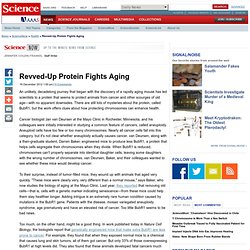
There are still lots of mysteries about the protein, called BubR1, but the work offers clues about how protecting chromosomes can enhance health. Cancer biologist Jan van Deursen at the Mayo Clinic in Rochester, Minnesota, and his colleagues were initially interested in studying a common feature of cancers, called aneuploidy. Aneuploid cells have too few or too many chromosomes. Senescent Cells Are Linked to Diseases of Aging, Study Finds. Molecular Fountain Of Youth Discovered By University of California Researchers. Protein That Reverses Heart Disease In Older Mice. Scientists at Harvard University think they have found a way to possibly reverse the aging process in human organs.
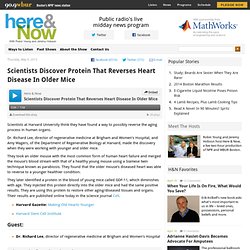
Dr. Richard Lee, director of regenerative medicine at Brigham and Women’s Hospital, and Amy Wagers, of the Department of Regenerative Biology at Harvard, made the discovery when they were working with younger and older mice. They took an older mouse with the most common form of human heart failure and merged the mouse’s blood stream with that of a healthy young mouse using a Siamese twin technique known as parabiosis. They found that the older mouse’s diseased heart was able to reverse to a younger healthier condition. They later identified a protein in the blood of young mice called GDF-11, which diminishes with age. Guest: Dr. Rejuvenate Blood Cells using Stem Cells. Johns Hopkins scientists have developed a reliable method to turn the clock back on blood cells, restoring them to a primitive stem cell state from which they can then develop into any other type of cell in the body.
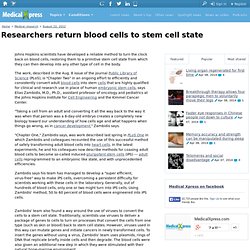
The work, described in the Aug. 8 issue of the journal Public Library of Science (PLoS), is "Chapter Two" in an ongoing effort to efficiently and consistently convert adult blood cells into stem cells that are highly qualified for clinical and research use in place of human embryonic stem cells, says Elias Zambidis, M.D., Ph.D., assistant professor of oncology and pediatrics at the Johns Hopkins Institute for Cell Engineering and the Kimmel Cancer Center.
"Taking a cell from an adult and converting it all the way back to the way it was when that person was a 6-day-old embryo creates a completely new biology toward our understanding of how cells age and what happens when things go wrong, as in cancer development," Zambidis says. Lifespan-Extending Drug Given Late in Life Reverses Age-Related Heart Disease in Mice. Rapamycin is already FDA approved for other indications June 10, 2013 / Novato, CA Elderly mice suffering from age-related heart disease saw a significant improvement in cardiac function after being treated with the FDA-approved drug rapamycin for just three months.
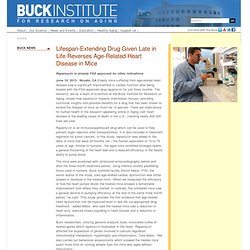
The research, led by a team of scientists at the Buck Institute for Research on Aging, shows how rapamycin impacts mammalian tissues, providing functional insights and possible benefits for a drug that has been shown to extend the lifespan of mice as much as 14 percent. There are implications for human health in the research appearing online in Aging Cell: heart disease is the leading cause of death in the U.S., claiming nearly 600,000 lives per year. Rapamycin is an immunosuppressant drug which can be used to help prevent organ rejection after transplantation.
It is also included in treatment regimens for some cancers. Reversing blood and freshening it up. 25 March 2013 The blood of young and old people differs.
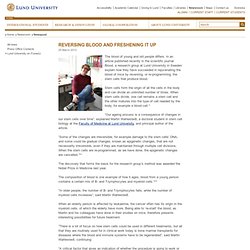
In an article published recently in the scientific journal Blood, a research group at Lund University in Sweden explain how they have succeeded in rejuvenating the blood of mice by reversing, or re-programming, the stem cells that produce blood.